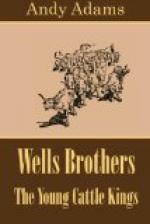The sound of a moving horse had caught the ear of the wounded man, and when the older boy dismounted at the tent opening, he continued: “Now, Joel, don’t let that cow outfit get funny with you. Show them the brand on that horse you’re riding, and give them distinctly to understand, even if you are barefooted, that you are one of Don Lovell’s men. Of course you don’t know him, but with that old man, it’s love me, love my dog. Get your dinner with the outfit, and watch for a dust cloud in the south. There’s liable to be another herd along any day, and we’ll need a cow.”
Forrest was nearly forty, while Priest was fully fifty years of age; neither had ever had children of his own, and their hearts went out in manly fullness to these waifs of the plain. On the other hand, a day had brought forth promise and fulfillment, from strangers, to the boys, until the latter’s confidence knew no bounds. At random, the men virtually spoke of the cattle on a thousand hills, until the boys fully believed that by merely waving a wand, the bells would tinkle and a cow walk forth. Where two horses were promised, four had appeared. Where their little store of provision was as good as exhausted, it had been multiplied many fold. Where their living quarters were threatened with intrusion, a tent, with fly, was added; all of which, as if by magic, had risen out of a dip in the plain.
There was no danger, at the hands of the trail men, of any discourtesy to Joel, but to relieve any timidity, the foreman saddled his horse and accompanied the boy a mile or more, fully reviewing the details of his errand. Left behind, and while rubbing the wounded limb, Dell regaled his patient with a scrap of family history. “Pa never let us boys go near the trail,” said he. “It seemed like he was afraid of you Texas men; afraid your cattle would trample down our fields and drink up all our water. The herds were so big.”
“Suppose the cattle would drink the water,” replied Forrest, “the owner would pay for it, which would be better than letting it go to waste. One day’s hot winds would absorb more water than the biggest herd of cattle could drink. This ain’t no farming country.”
“That’s so,” admitted Dell; “we only had one mess of peas this season, and our potatoes aren’t bigger than marbles. Now, let me rub your knee, there where the bullet skipped, between the bandages.”
The rubbing over, Forrest pressed home the idea of abandoning farming for cattle ranching. “What your father ought to have done,” said he, “was to have made friends with the Texas drovers; given them the water, with or without price, and bought any cripples or sore-footed cattle. Nearly every herd abandons more or less cattle on these long drives, and he could have bought them for a song and sung it himself. The buffalo grass on the divides and among these sand hills is the finest winter grazing in the country. This water that you are wasting would have yearly earned you one hundred head of cripples. A month’s rest on this creek and they would kick up their heels and play like calves. After one winter on this range, they would get as fat as plover. Your father missed his chance by not making friends with the Texas trail men.”




